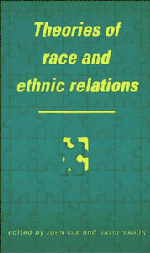Book contents
- Frontmatter
- Contents
- List of contributors
- Preface
- Introduction. Controversies and continuities in race and ethnic relations theory
- 1 Intersecting strands in the theorisation of race and ethnic relations
- 2 Epistemological assumptions in the study of racial differentiation
- 3 The role of class analysis in the study of race relations – a Weberian perspective
- 4 Varieties of Marxist conceptions of ‘race’, class and the state: a critical analysis
- 5 Class concepts, class struggle and racism
- 6 A political analysis of local struggles for racial equality
- 7 Ethnicity and Third World development: political and academic contexts
- 8 Social anthropological models of inter-ethnic relations
- 9 Pluralism, race and ethnicity in selected African countries
- 10 Ethnicity and the boundary process in context
- 11 Ethnicity and the sociobiology debate
- 12 Rational choice theory and the study of race and ethnic relations
- 13 The ‘Chicago School’ of American sociology, symbolic interactionism, and race relations theory
- 14 The operationalisation of identity theory in racial and ethnic relations
- Bibliography
- Index
12 - Rational choice theory and the study of race and ethnic relations
Published online by Cambridge University Press: 01 June 2011
- Frontmatter
- Contents
- List of contributors
- Preface
- Introduction. Controversies and continuities in race and ethnic relations theory
- 1 Intersecting strands in the theorisation of race and ethnic relations
- 2 Epistemological assumptions in the study of racial differentiation
- 3 The role of class analysis in the study of race relations – a Weberian perspective
- 4 Varieties of Marxist conceptions of ‘race’, class and the state: a critical analysis
- 5 Class concepts, class struggle and racism
- 6 A political analysis of local struggles for racial equality
- 7 Ethnicity and Third World development: political and academic contexts
- 8 Social anthropological models of inter-ethnic relations
- 9 Pluralism, race and ethnicity in selected African countries
- 10 Ethnicity and the boundary process in context
- 11 Ethnicity and the sociobiology debate
- 12 Rational choice theory and the study of race and ethnic relations
- 13 The ‘Chicago School’ of American sociology, symbolic interactionism, and race relations theory
- 14 The operationalisation of identity theory in racial and ethnic relations
- Bibliography
- Index
Summary
Rational choice theory is the closest thing to a paradigm in current social science. Found in disciplines as disparate as economics and anthropology, this doctrine assumes the theoretical primacy of individual actors rather than of pre-existent social groups. These actors are conceived to have particular goals that cannot all be equally realised, for people live in a world of scarcity and uncertainty and, as a result, must select between alternative courses of action. The hallmark of this approach is the view that their selection of a course of action is rational and will be the most effective means of realising their preferred goal (Heath 1976 offers a good introduction).
Although rational choice has a very long pedigree in social science – its parentage derives from Thomas Hobbes's writings in the seventeenth century – only recently has the approach been applied to the study of ethnic and race relations (some examples include Rabushka and Shepsle 1972; Sowell 1975; Landa 1981; Hechter, Friedman and Appelbaum 1982; and Banton 1983). Rather than generating new evidence or testing specific hypotheses, applications such as these tend to synthesise evidence about intergroup relations and interpret it in the light of a particular explanatory scheme. Even a sympathetic observer would have to concede that it is far too early to predict the success of this kind of enterprise.
- Type
- Chapter
- Information
- Theories of Race and Ethnic Relations , pp. 264 - 279Publisher: Cambridge University PressPrint publication year: 1986
- 30
- Cited by



